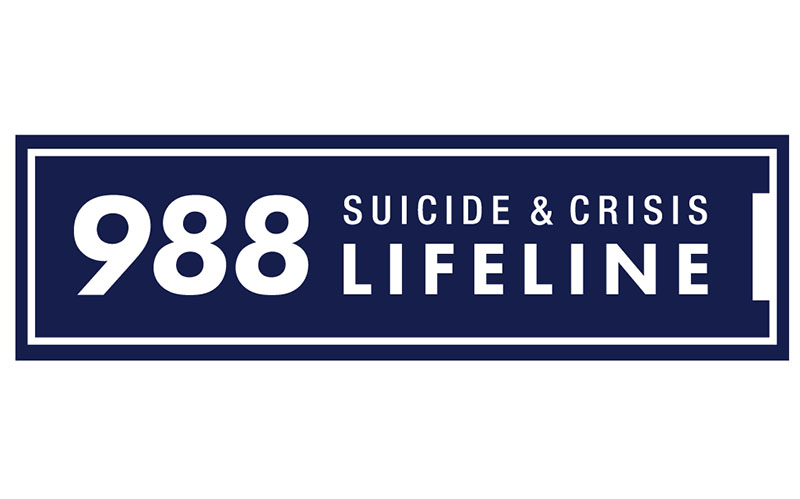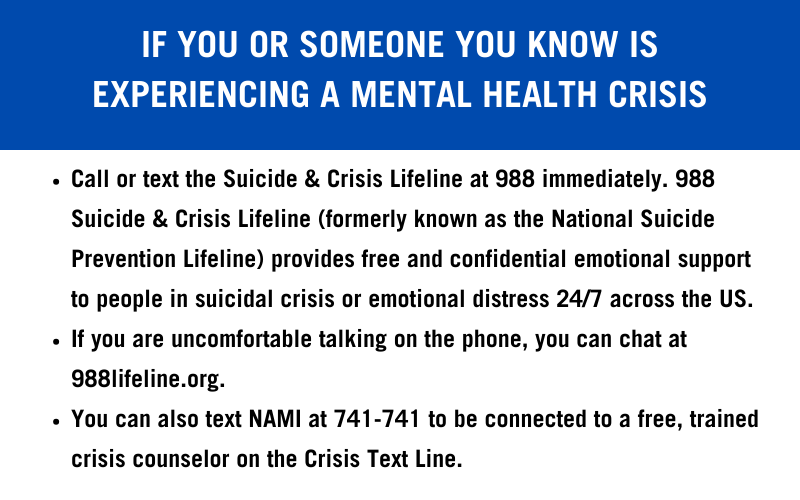

September is Suicide Prevention Awareness Month. It’s a tough subject but knowing warning signs and risk factors of suicide, and how you can support a loved one in crisis is vital. And if you yourself are in crisis, know that you are not alone!
Statistics:
According to the Centers for Disease Control (CDC), in 2021 suicide was among the top 9 leading causes of death for people ages 10-64 and the second leading cause of death for people ages 10-14 and 20-34. Here are some additional statistics, provided by the National Alliance on Mental Illness (NAMI):
- Although more women than men attempt suicide, men are 4x more likely to die by suicide.
- 79% of people who die by suicide are male.
- 46% of people who die by suicide had a diagnosed mental health condition – but research suggests that 90% may have experienced symptoms of a mental health condition.
- Lesbian, gay and bisexual youth are 4x more likely to attempt suicide than straight youth.
- Transgender adults are nearly 9x more likely to attempt suicide at some point in their life compared to the general population.
Warning signs:
Most people who die by suicide have a mental health issue. It may be a depression or substance abuse disorder. They may feel lonely, depressed, or isolated. They may have had a traumatic life experience. Many of the warning signs of suicidal feelings are also signs of depression.
People at risk of suicide may have any of these:
- Changes in eating and sleep habits
- Loss of interest in usual activities
- Pulling away from friends and family members
- Acting out behaviors
- Running away
- Alcohol and drug use
- Not caring about personal appearance
- Excessive risk taking
- Fixation on death and dying
- Increased physical complaints linked to emotional distress, like stomachaches, headaches, and extreme tiredness
- Loss of interest in work, school, and community
- Feelings of boredom
- Trouble concentrating
- Feelings of wanting to die
- Lack of response to praise
A person is at risk if they show signs of plans to die by suicide. They may:
- Give away favorite possessions and throw away important belongings
- Becomes suddenly cheerful after a period of depression
- Express bizarre thoughts
- Say “I want to kill myself”
- Say “I’m going to commit suicide”
- Say “I won’t be a problem much longer”
- Say “If anything happens to me, I want you to know ….”
- Write one or more suicide notes
The warning signs of suicide may seem like other health problems. Always talk with a healthcare provider for a diagnosis.
What should you do?
Take threats of suicide as a cry for help. Always take statements of suicidal feelings, thoughts, behaviors, or plans very seriously. Any person who expresses thoughts of suicide needs help right away.
- Call or text 988 or 800.273.TALK right away. When people text 988, they will be connected to trained counselors who are part of the 988 Suicide & Crisis Lifeline. An online chat option is also available. Or take the person to the nearest emergency room. Or contact their mental health provider.
- Take the person seriously.
- Don’t leave the person alone.
- Involve other people. Contact friends and family members.
- Express concern.
- Listen attentively.
- Ask direct questions.
- Acknowledge the person’s feelings.
- Offer support.
- Don’t promise confidentiality.
- Keep possibly harmful objects hidden. This includes weapons, firearms, and medicines.
- Prepare for the person to need to stay in the hospital if the healthcare provider advises this.
For more suicide prevention resources visit:
- 988 Suicide & Crisis Lifeline
- National Alliance on Mental Illness (NAMI)
- CDC Suicide Prevention
- Bethe1to.com
Content for this article is derived from the Staywell Health Library, the Centers for Disease Control, the National Alliance on Mental Illness, and 988 Suicide & Crisis Lifeline.

